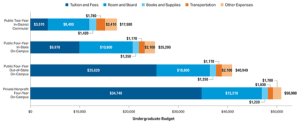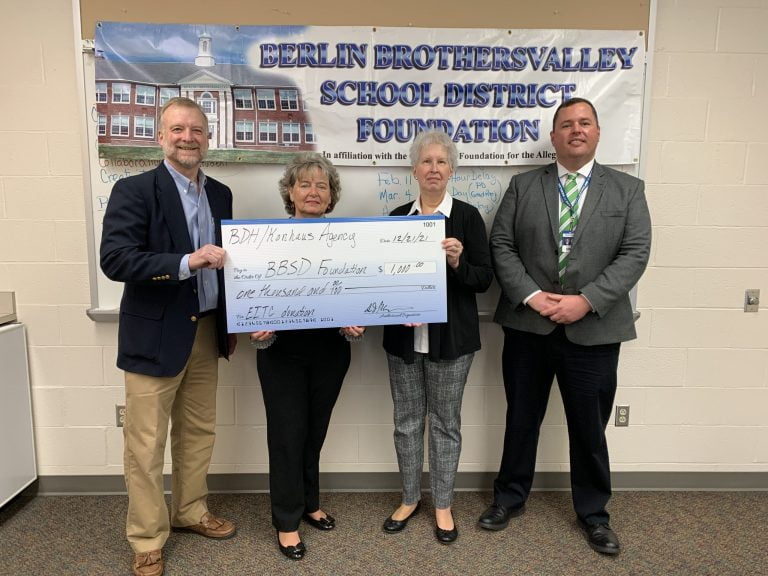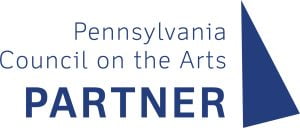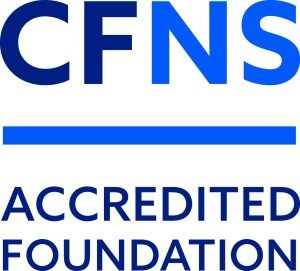The headlines are inescapable: college is expensive, averaging about $17,500 a year for a public two-year college, to over $50,000 a year for a private 4-year university.* To pay for it, families navigate a labyrinth of funding sources, tapping into salaries and savings accounts, utilizing grants and scholarships, and resorting to various loans to cover what’s left.

In Pennsylvania, two-thirds of 2016’s high school graduates went on to a two or four-year college.** 68% of those students take on debt to pay for it – and they’re taking on more than most others. The Commonwealth ranks second-highest in the country for student debt, averaging close to $36,000.***
The promise of professional success and financial security to individuals who pursue their post-secondary education is enough to convince families the struggle is worth it, and generally it is. College graduates earn more than their high-school counterparts, and have drastically lower unemployment rates. The benefits aren’t just professional: college grads are also more than twice as likely to vote, to volunteer in their communities, and to exercise, than individuals without their post-secondary degree.* College graduates affect stronger, healthier, more prosperous, communities.
At the Community Foundation for the Alleghenies, scholarships make up nearly a third of our funds. “The correlation is clear: empowering students empowers communities.” says CFA President Mike Kane. “We are committed to helping our partners uplift students through higher education at all levels. Our donors are from here, so they know what local students need, and they’re meeting those unique needs by funding a path to a successful future.”
The CFA offers more than 225 scholarships, totaling over $550,000. They’re available to students going to vocational school, two-year college, and four year colleges and universities. Each of those was created by an individual, family or organization with the generosity and foresight to help our communities’ young people lay the foundation for personal and economic security. Donors often establish scholarships in honor of a departed loved one, or to encourage certain career paths. The body of funds aids most types of students, addressing a wide variety of ages, interests, and abilities.
That need is great, particularly in this region, where most of our public schools serve high percentages of families that struggle financially. At the Richland School District, considered high income for our region, more than a third of the students qualify as economically disadvantaged. Richland Administrators place a premium on education beyond high school, as evidenced by the high school’s first-place ranking for SAT scores among schools in the Appalachia IU8, and investments in technology and other resources to prepare students for post-secondary programs.
“Most of our families expect their children to go to college, says Superintendent Arnold Nadonley. “Our job is not only to make them ready for it, but to make sure they excel once they get there.”
Richland is so committed to helping students get to college that it has its own scholarship foundation, in partnership with the CFA. “We don’t want money to stand in the way of motivated students, or the teachers who inspire them.” adds Nadonley. “The scholarships we offer start in the classroom, giving teachers the resources they need to engage students in dynamic lessons. We also offer scholarships to select graduates as they head off to college, to help defray the overwhelming costs they’ll face when they get there.”
Last year, undergraduate students across the country received an average $14,400 in aid, including $8,440 in grants and scholarships, $4,620 in federal loans, and $1,340 in a combination of tax credits and deductions and Federal Work Study.* For most of them, every dollar they receive in scholarships means one fewer dollar in loans.
CFA scholarship awards range from a few hundred to many thousands of dollars each. Some students double those payouts through the Pennsylvania Higher Education Assistance Agency. As the region’s only PHEAA PATH match partner, the Community Foundation is uniquely qualified to double the impact of our donors.
Any college student will tell you: every dollar counts.
Discover available funding online through our easy-to-search scholarship page. To create a scholarship, contact Katrina Perkosky: kperkosky@cfalleghenies.org / (814) 208-8411.
Sources:
*The College Board: trends.collegeboard.org.
**PA Department of Education: http://www.education.pa.gov/Data-and-Statistics/Pages/Graduates.aspx
*** Institute for College Access & Success https://ticas.org/posd/map-state-data#










